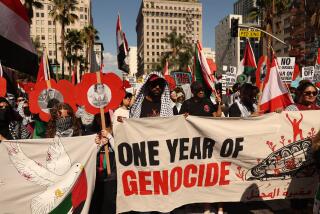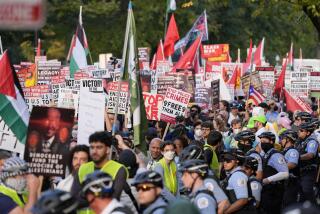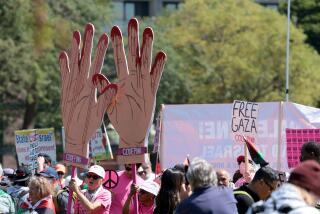May Day demonstrators rally across U.S.
- Share via
May Day protesters marched down streets across the country Wednesday, calling on lawmakers to provide a path to citizenship for the estimated 11 million immigrants who have entered the country illegally or overstayed their visas.
The crowds numbered in the thousands, not the hundreds of thousands who turned out for the historic immigration marches of 2006. But with a major immigration package being debated in Washington, reform advocates wanted their voices heard.
“Listen up, Obama: We are in the fight,” people chanted in Spanish in Los Angeles and Chicago.
In downtown Los Angeles, the boisterous mood was punctuated by mariachi music and Aztec drumming. Marchers from immigrant rights groups and labor unions carried signs in English, Spanish, Chinese and Korean demanding “Legalization now” and an end to deportations. American flags were everywhere.
The march, which moved from Olympic Boulevard along Broadway and ended with a rally at Olvera Street, caused moderate traffic backups throughout the afternoon and early evening.
Gabriel Zamora joined the march to bring attention to immigrants such as himself, who hold down jobs but lack proper documentation.
“We’re here to demand political change and fair immigration reform,” Zamora, a janitor who crossed the border illegally from Tijuana eight years ago, said in Spanish. “But we’re also here out of a spirit of celebration. We’re celebrating the power of workers. And the power of well-being that comes with working.”
In Arizona, which has enacted harsh laws against illegal immigration, about 300 demonstrators showed up at the state Capitol, compared with 100,000 in 2006.
“I want to be here legally,” said a 44-year-old Mexican immigrant named Alicia, who would give only her first name because she fears being deported. “We need reform. I want to be able to work and walk in the streets without worry.”
Protesters who gathered at Union Square in New York were less focused on immigration reform and more on the Occupy Wall Street movement.
Performance artist Marni Halasa, 47, held a whip and a blow-up doll of Jamie Dimon, along with a sign saying that the JPMorgan Chase chief executive needed to be whipped.
“Big banks can do whatever they want and no one ever goes to prison,” she said.
In front of an electronics store on Broadway in downtown Los Angeles, Nissem Bachsian watched the May Day protesters stream by, as he does every year on the international workers holiday.
In 2006, the crowds spilled onto Spring and Hill streets, Bachsian recalled. This year, the size of the march, an annual rite in many cities, was more typical.
Bachsian, who manages the store, moved to the United States from Israel when he was 5. He says he sympathizes with immigrants who are in the country without proper documentation. But he questions whether street protests make a difference, because every year the same groups go past chanting the same slogans, and nothing changes.
“I can understand where they’re coming from, the hard workers who are not getting papers and nobody’s listening,” said Bachsian, 42. “This has been going on for the past couple years, every year on May 1. Are things changing in their favor?”
At the post-march rally, Los Angeles mayoral candidate Wendy Greuel meandered through the crowd, shaking hands and posing for pictures.
“Today, particularly, people are here to talk about real immigration reform,” she said.
John Lopez, who works with Filipino immigrants at the Asian Pacific American Legal Center, told the crowd to keep pushing for reform, including revisions to the bill introduced in the Senate last month.
The bill does not allow American citizens to sponsor their siblings for green cards, as they currently can — a change that particularly worries Asian American groups.
“When we talk about family reunification, aren’t brothers and sisters family, too?” Lopez asked.
Times staff writers Alana Semuels, Tina Susman, Cindy Carcamo, Andrew Blankstein, Antonio Olivo and Kim Geiger contributed to this report.
More to Read
Sign up for Essential California
The most important California stories and recommendations in your inbox every morning.
You may occasionally receive promotional content from the Los Angeles Times.












